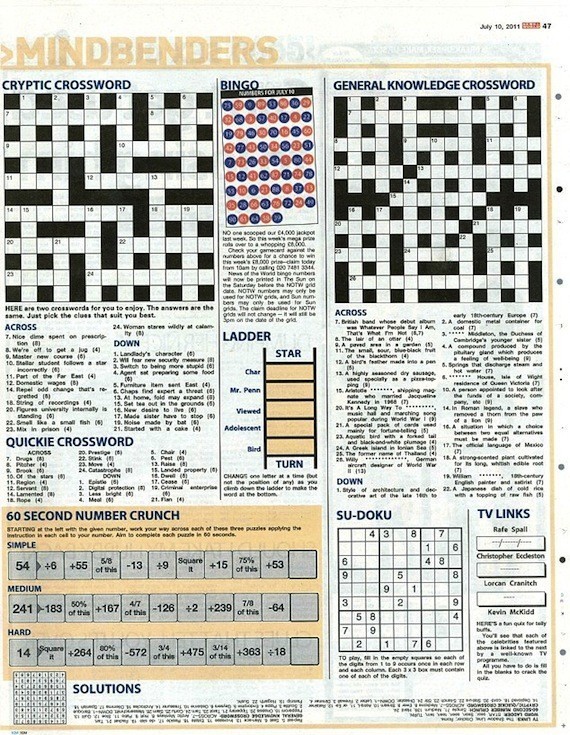


I knew, before I checked, that it was the puzzle from the day before, one she’d completed, filling in every last letter, for certain, before the solution arrived the following day. Like a variation on faith-if you could check, what was the point of the struggle? If the answers were available, life was cheapened.Īnd the day after she died, twenty years ago now, there was a newspaper folded to the crossword puzzle lying face up on the end table by the couch. You fill in every space without being able to verify your answers. What joy she must have had finding the word eight pages in at plo after fruitlessly reading through the plas, the ples, and the plis. In the dictionary by my computer there are twelve pages of words beginning with pl. My mother sometimes opened a dictionary to words beginning with pl, combing through pages to discover a seven-letter word for which she had only those two beginning letters. And if I became stuck with two or three letters unfilled, I’d keep that puzzle in front of me, still believing, until the seat-belt sign went off at the gate, that the improbable variant spelling might come to me. My response? I’d know because the letters all intersected perfectly, even the final clue that asked for an archaic spelling. Someone might sensibly point out that without the answers I’d never know if my solution was correct. There I was, my mother’s son, carrying on her attitude as if it were securely lodged in my DNA. And I didn’t want to make one error as I worked that puzzle in ink. Suddenly, I admit, I wanted to tear out the answer page before I began, stuff it into the wrapper for the tiny pretzels that come with the complimentary drink. As if she could solve it perfectly, letter by letter. She would have begun the puzzle at once if there could be belief that she’d managed every letter exactly. Of course, it would have been a different story if she believed the next passenger could open to the flawlessly completed puzzle and discover that the solution wasn’t printed elsewhere in the magazine.

That magazine has the solution printed on another page, cheating so accessible I knew that my mother would rather sink into boredom or anxiety than do that crossword. If they’re out there, I’ve never seen a puzzle book with no answers in the back, but I thought of my mother as I sat on a plane last week working the crossword in the United Airlines magazine. And it didn’t matter if they only glanced at one word in the upper right hand corner, covering the answers with their hand and inching down to reveal just that one word. The puzzles, according to her, were cheapened by those filled-in grids because, she said, “You never know if somebody cheated.”īecause those answers were there, anyone could work the puzzles in those books, my mother insisted, even the ones marked “expert.” All they had to do was flip to the back and sneak a quick look. Anyone seeing her filled-in puzzles would never be certain she hadn’t peeked. My mother loved crossword puzzles, spending hours, sometimes, until she managed to work out the answers to clues like “bright colored aquarium fish” and “English composer, Frederick.” “Danio,” she’d finally fill in, and “Delius,” and for a day or two she’d leave the large Sunday newspaper puzzle face up on the end table by the couch like a trophy.īut she refused to do the crosswords in puzzle books, not because they were too hard or too easy, but because the solutions were printed in the back of those books.


 0 kommentar(er)
0 kommentar(er)
